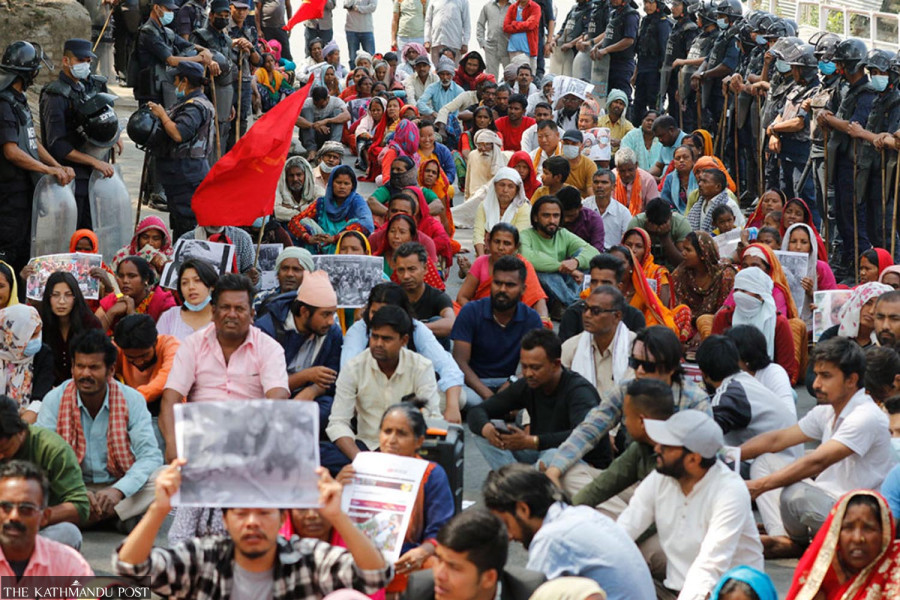National
Loan shark victims brave inclement weather to continue protest
More than six dozen protesters, who have been spending their nights in tents, are suffering from headache, cough, shortness of breath, diarrhoea and pain in their eyes.
Anup Ojha
On May 1, when the world marked the International Workers’ Day, 70-year-old Ram Kawal Chamar was sitting quietly in a tent at Shanti Batika, Ratnapark with one arm in a plaster cast.
Chamar, one of the several loan shark victims, was badly injured on April 17 during a clash between the police and hundreds of other such victims when they tried to reach Singha Durbar to stage a demonstration.
According to police, nine protesters were injured in the clash. Police threw tear gas and water cannons to disperse the crowd and stopped them from carrying out their protest.
As Kathmandu has seen rainfall in the past few days, bringing a sudden chill in the weather, Chamar is down with common cold and fever. Like Chamar, about six dozen victims who came mostly from the Tarai belt—Rupandehi, Nawalprasi, Kapilvastu, Dang, Kailali, Surkhet and Bardiya—to pressurise the government to deliver justice to them are also suffering from headaches, cough, shortness of breath, diarrhoea and pain in the eyes.
On April 3, loan shark victims from 20 districts of the Tarai arrived in Kathmandu to stage protests after the government failed to comply with a previously signed agreement.
“Because of the bad weather and cold, over 70 people have fallen sick, and almost every day, one or the other gets admitted to Bir Hospital,” said Awadesh Kushwaha, coordinator of the Farmers-Workers Struggle Committee against Loan Sharking and Frauds.
According to Kushwaha, around 250 victims are currently camping in the open space at Shanti Batika in half a dozen tents and on the premises of a temple. Almost all are suffering from poor health and they are regularly taking paracetamol, Jeevan Jal, and other medicines.
“Wednesday will mark a month since we have been here for protest, but the government has not shown any concern to address our problem,” Kushwaha said.
Chamar’s wife, Ramrati, and his 12-member family are living in worry back in the village in Shrirampur ward-5 of Partapur Rural Municipality. The old man had borrowed Rs80,000 in 2009 from a man named Jagadish Baniya of the same village to send his son Ramesh to Malaysia.
“I have already paid him Rs900,000 that was the total amount my son sent from abroad, but still Baniya demands Rs173,000, and he has already taken my four kattha {14,580 sq feet] land, showing evidence from the court that I could not pay him back his loan,” said Chamar, his voice quivering.
Another loan shark victim who is suffering from headache and diarrhoea is Raju Devi Ram, 50. She had sustained injuries on her head during the clash with police last month.
“I have been taking paracetamol for a headache, but it’s not working,” said Ram, who came from Rupani Rural Municipality, ward-6, Saptari. “The cold has become severe, but the government is not listening to our problem.”
She had taken Rs350,000 as loan—Rs150,000 to send her husband abroad and Rs200,000 for her son, also for foreign employment—seven years ago.
Her family has already paid Rs1.5 million but the loan shark is demanding Rs3 million, she said. “He is demanding my land in return if I am not able to pay back the demanded amount.”
Showing nine stitches on her head, Ram says she still takes painkillers to get relief from the pain.
“Now, it feels that if we stay here longer, we will become diseased,” she added. “The government seems indifferent to our demands.”
Human rights and civil society activists have long been calling on the government to address the loan shark victims’ demand.
“They are here with genuine issues, most having lost all their property to loan sharks,” said Mohna Ansari, a human rights advocate and former commissioner of National Human Right Commission. “The government should immediately address their demands and make a conducive environment to enable them to return to their homes.”
This is not the first time loan shark victims are protesting in the Capital. In August last year, more than 200 loan shark victims protested in Maitighar. They had staged a sit-in protest for 61 days and had returned home after an agreement with the government on September 17.
The Farmers-Workers Struggle Committee against Loan Sharking and Frauds, which had signed an agreement with the government last year, has criticised the government for keeping the victims on tenterhooks. They have also criticised the government decision to form a commission instead of introducing a law against lenders charging exorbitant interest rates.
Meanwhile, Chamar, who has been in the Capital for a month, says he is missing his family members. “But this is a fight for life and against injustice,” he said. “If the government makes a law against law sharking, hundreds of people in Tarai will not have to suffer.”
Chamar went on, “My family members know that my hand is broken and are worried about my health. But this time, I won’t go back without getting justice.”




 17.12°C Kathmandu
17.12°C Kathmandu.jpg)













